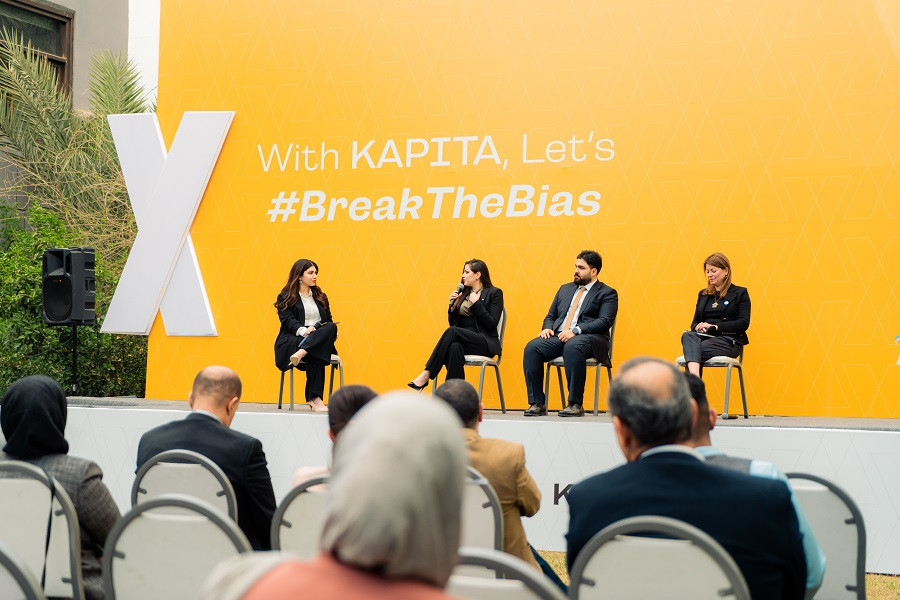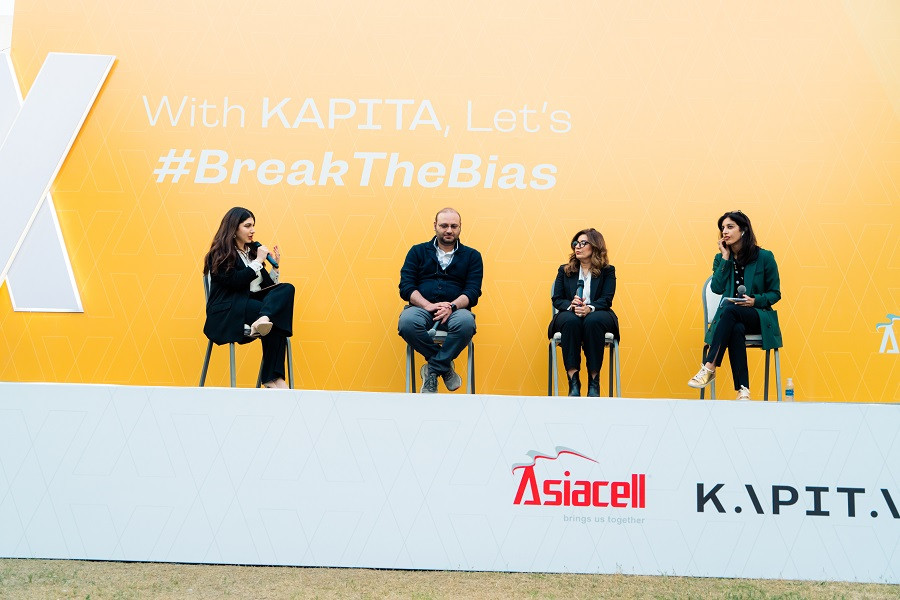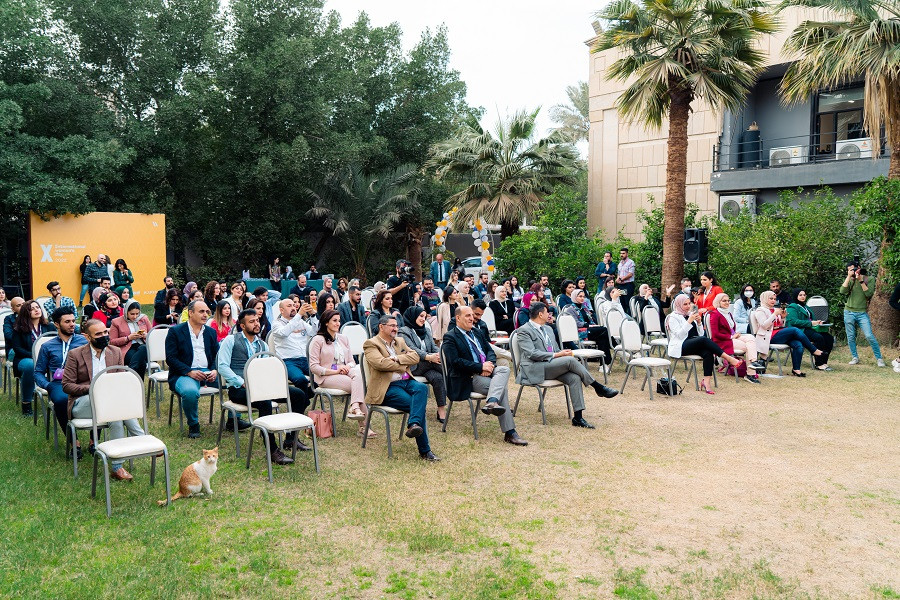Business Meetup Scope
International Women's Day: Breaking the Bias
Women have been paving their way into the Iraqi ecosystem, navigating its challenges while at the same time dealing with the accompanying biases, gender stereotypes, the glass ceiling, and cultural and societal barriers.
To celebrate those women and honor their contributions to the Iraqi scene, KAPITA has organized a business meetup event titled “International Women’s Day: Breaking the Bias.” The meetup shed light on the most prominent challenges for the women in the Iraqi scene, the root causes of these issues, and the possible approaches to tackle them. Addressing these challenges will pave the road toward tangible solutions. The types of solutions that can create a more inclusive ecosystem where women feel enabled, empowered, and have the same access to opportunities and rights, to be able to lead the ecosystem to grow and prosper.
The two panel discussions included Mohammed Jamal, managing director of research and development at KAPITA Business Hub; Ghina Taha, acting HR manager, General Electrics - Iraq, and Christine van den Toorn, founder and president of Iraq Higher Education Fund and their flagship project Baghdad Business School, for the first panel. The second panel hosted Ali Al-Hilli, marketing and communications consultant at Blue Pay, Ava Nadir, member of the Commission of Media and Communication (CMC) Iraq, and Sherizaan Minwalla, founder of Taboo LLC.
The panelists addressed the most prominent challenges women face today in the private sector and the entrepreneurial scene and dissected the underlying causes while highlighting some critical steps that can be taken to take those challenges.
The root causes of the problem that women go through today can be traced back to the formative years of women growing up. Girls are mostly encouraged to stay in their comfort zone, and their ambitions are often dismissed or discouraged. They are steered away from taking risks and pursuing certain career paths. When they grow up, they are also encouraged to find jobs that are “secure” enough—all of this while having to fight stereotypes such as that they are more emotional or cannot be a decision-maker and take on higher positions. This hinders their opportunity to take up leading positions, realize their potential, and participate in the ecosystem.
Moreover, education plays an integral role in preparing youth for the job market. This is particularly emphasized for women, as they do not have as much access to many opportunities to equip them with the necessary toolkit and skills. Ensuring that the admissions are gender-sensitive and inclusive will allow more women access to educational opportunities. Ms. Christine van den Toorn added, “Half our class of Baghdad Business School are women. Education prepares women for the workplace; everything starts there. There are certain steps we do to attract them and retrain them. Young women might not have as many opportunities as young men, so we make sure to interview all women who apply and cater our social media campaigns towards them.”
Also, implementing extracurricular activities help shape the personality and outlook of students. Encouraging women in particular to participate will empower them to take active roles later in their careers.
In addition, shaping the pedagogy and including critical thinking, research, and analysis, are necessary steps to develop the mindset. Also, having a mentor or an advisor for women at this stage could empower them to overcome many issues or problems that might be preventing them from taking their role in society.


The private sector in Iraq is still not the preferred choice for many youths to work, as it is more demanding in terms of skills, experience, workload, and working hours and offers less stability. This issue is prevalent in both genders but is more pronounced in the case of women. The unequal footing of chores and responsibilities women experience at home leads them to seek employment in the public sector, where they have more secure careers that also offer maternity leaves and pension plans and allow them to attend to their roles at home.
Mrs. Ghina Taha explained that private sector companies need to implement policies to attract and retain their female candidates and execute programs that empower women and prepare them for the workplace. “At GE, we have our graduate programs that helped many women take up leadership roles in men-dominated areas. As a company, we strive to provide them with the right environment to prosper and thrive.” Internships can also play a vital role in attracting and training the youths for the private sector while providing equal opportunities for students of both genders. They also allow for a smoother transition from college to the workplace and prepare them for their careers.
Mr. Mohammed Jamal added, "The ecosystem is still nascent. Women participate almost equally in our incubator and accelerator programs at KAPITA. Still, we see that women founders have not yet obtained investments compared to the men founders; we also see a lack of women participation on the investors’ table.” KAPITA has ensured that enabling women in the Iraqi ecosystem is a part of its core values. KAPITA tries to further understand the challenges of women and how to tackle them through its Research and Development arm. Having an overview of the situation on multiple levels and from various aspects, supported by data, enables the drawing of frameworks that offer better solutions. In addition, KAPITA has also developed its incubator and accelerator programs, Orange Corners and Scale-Up Academy, to encourage women entrepreneurs and founders to participate. Also, KAPITA had undertaken the task of creating a healthy, safe environment, hybrid classes model, targeted social media campaigns, and promoting the inspiring journeys of leading key women figures in the ecosystem.
Mr. Mohammed Jamal added that “The ecosystem has come a long way since its humble beginnings. However, there is still a long road ahead of us; it is the responsibility of all to break the bias and enable women to take up their destined role in the ecosystem.”
Furthermore, the entrepreneurial scene is still young and not fully developed. “We still have more SMEs than startups,” Mr. Ali Al-Hilli added.
The Women entrepreneurs' journey is not that much different from their men counterparts in its beginning as the challenges are somewhat similar. Both men and women are entering this scene with the least amount of resources and have the same raw material for entrepreneurship and very limited networks. Mr. Ali elaborated that “The hassle begins, further into the road, when we accelerate those startups. The number of the programs is still deficient compared to the youth population in the country and is still focused in certain cities. Therefore, the competition for those opportunities is very difficult. The challenges women face, lack of access to training to build their skills, and their responsibilities at home prevent them from competing fairly with their male counterparts.”
Another critical issue that was raised is digital inclusion and its importance in combating gender disparities.
The Commission of Media and Communication (CMC) has strived to tackle this; Ms. Ava Nadir added that “Digital inclusion is important to bridge the gap between women and men and enable women to have access to the same resources and opportunities as men. We have implemented a few interventions to raise awareness and ensure the technology's affordability and availability.”

Consequently, legislation, or lack thereof, is a hindering factor that limits women's participation in all aspects of society. Enforcing the frameworks and legislation to tackle women's challenges is a crucial part of enabling women in the Iraqi ecosystem. Mrs. Sherizaan Minwalla explained, “The monitoring and implementing entities for legislation are weak or absent. The current labor law that was issued in 2015 is progressive, inclusive, and guarantees workforce rights. It also tackles many issues such as harassment, equal pay, and maternity leave. However, little has been done to enforce this on the ground.”
Procedures on a macro level could further enable and empower women and protect their rights against harassment, discrimination, and violence that ultimately prevent women's participation in society. The responsibility also falls on organizations and companies to employ a gender lens and ensure gender equity in the workplace, and that women are supported, empowered, and granted access to the same resources and opportunities, that they can reach leadership roles, and the evaluations are merit-based.
The journey to ensuring gender equity in education, the workplace, the entrepreneurial scene, and the ecosystem is arduous, but change is inevitable; hence it is everyone’s responsibility from individuals, companies, organizations, authorities, and the government to take steps in this direction.
Download the pdf version of the article
